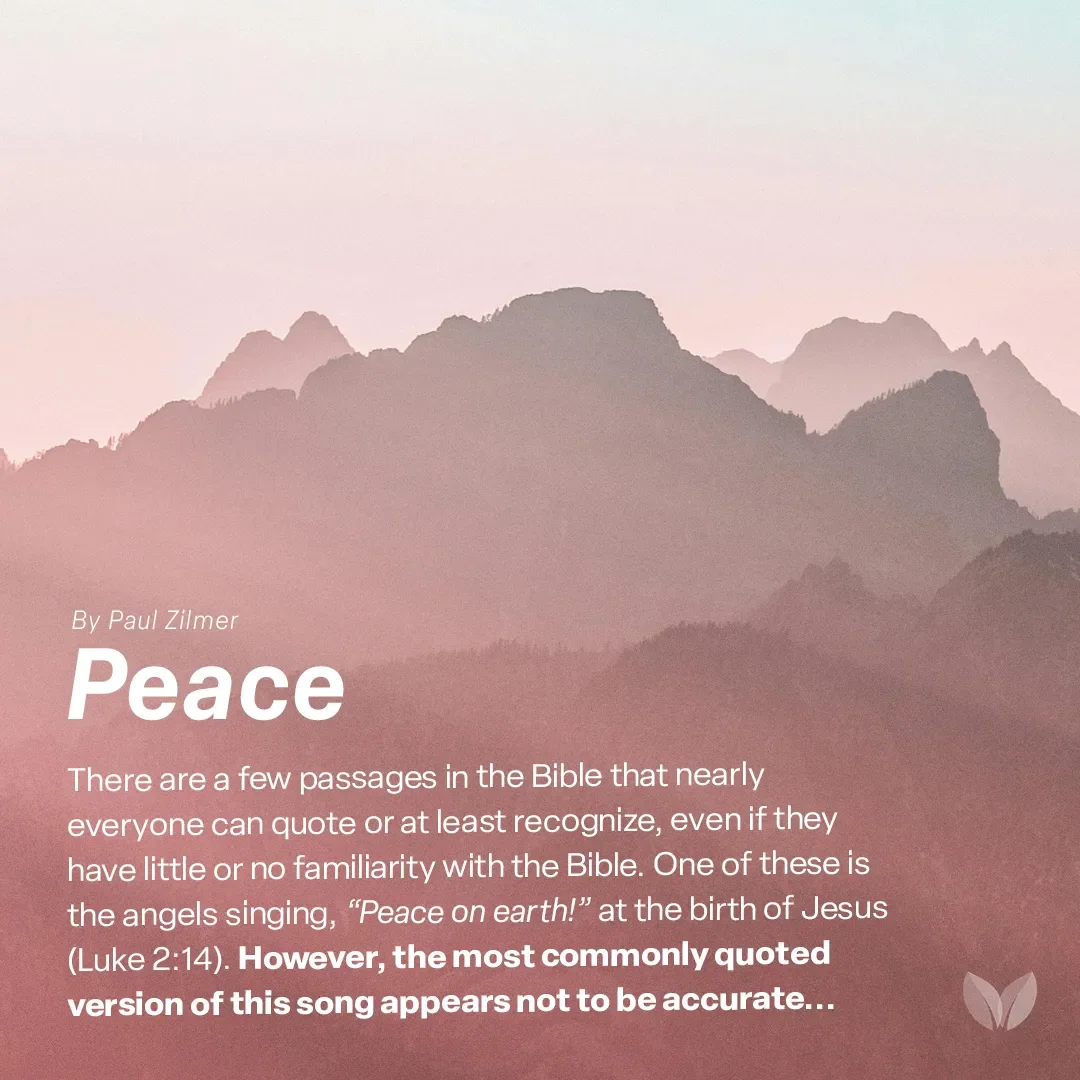Peace
There are a few passages in the Bible that nearly everyone can quote or at least recognize, even if they have little or no familiarity with the Bible. One of these is the angels singing, “Peace on earth!” at the birth of Jesus (Luke 2:14). This is generally taken as rejoicing in the one who will now bring peace to the earth. However, the most commonly quoted version of this song appears not to be accurate. Nearly all other versions render the lyric as, “Glory to God in the highest, and on earth peace among those with whom he is pleased!” or “On earth peace to those who have his good will!”
Do you see the difference? It’s not a promise to establish peace on the earth. It’s a declaration that people who please God will be at peace, with each other and internally within themselves.
Here’s what Jesus himself says on the subject:
“Do not think that I have come to bring peace to the earth. I have not come to bring peace, but a sword. For I have come to set a man against his father, and a daughter against her mother, and a daughter-in-law against her mother-in-law. And a person's enemies will be those of his own household. (Matthew 10:34-36)
This has proven quite true. Jesus’s message is radical, not reconcilable with other religions. (Sadly, it has also proven true in the conflicts among factions of Christianity. A topic for some other time.)
Now, we need to be clear that Jesus is not talking about his followers going to war—as his words have sometimes been twisted to suggest. Jesus says flat out, “My kingdom is not of this world. If my kingdom were of this world, my servants would have been fighting… But my kingdom is not from the world.” (John 18:36) The apostle Paul expands on this:
We are not waging war according to the flesh. For the weapons of our warfare are not of the flesh but have divine power to destroy strongholds. We destroy arguments and every lofty opinion raised against the knowledge of God… (2 Corinthians 10:3-5)
So the “sword” Jesus says he brings isn’t literal. But there’s another dimension to this topic that we can’t overlook. Psalm 2 is quoted in the New Testament as being prophetic of the Messiah, which we would be able to figure out even without being told. The Almighty says this:
“As for me, I have set my King on Zion, my holy hill.” I will tell of the decree: The LORD said to me, “You are my Son; today I have begotten you. Ask of me, and I will make the nations your heritage, and the ends of the earth your possession. You shall break them with a rod of iron and dash them in pieces like a potter's vessel.” (Psalm 2:6-9)
This sounds like actual warfare, and indeed it is. There is a lot of prophecy along the same lines, for instance Psalm 110, Daniel 2:44, 1 Corinthians 15:24-25, Revelation 2:26-27.
Ultimately, after Messiah’s conquest described in these passages, Jesus Christ, the Lord’s Anointed, will establish peace in the earth. This is the Christian hope! Beautiful passages such as this describe it:
Out of Zion shall go forth the law, and the word of the LORD from Jerusalem. He shall judge between the nations, and shall decide disputes for many peoples; and they shall beat their swords into plowshares, and their spears into pruning hooks; nation shall not lift up sword against nation, neither shall they learn war anymore. (Isaiah 2:3-4)
In the meantime, is there then no peace? Fortunately, in Jesus we have a source of peace right now, one that endures.
Peace I leave with you; my peace I give to you. Not as the world gives do I give to you. Let not your hearts be troubled, neither let them be afraid. (John 14:27)
I have said these things to you, that in me you may have peace. In the world you will have tribulation. But take heart; I have overcome the world. (John 16:33)
He’s talking about an inner peacefulness which isn’t dependent on outward circumstances. He expects that we’ll have his peace in spite of tribulation – a word that’s quite strong, and actually quite scary. But he gives us his peace even then.
So here’s what we have. Jesus and his message bring a serious conflict with the world’s standards and behaviors and ideas. We are participants in that conflict—there is no sitting on the sideline. But we have no part in the wars waged in the world. When Jesus returns, he will be enthroned by his Father and given authority to break the rule of sinful humans, and bring all into submission to God. And then, finally, there will be complete peace, all wars a thing of the past.
The conflicts aren’t easy on us now. Of course neither Jesus nor the Father ever promised us an easy road. But we do have a wonderful future to look forward to. The establishment of justice, truth, righteousness, peace. And our confidence in that hope gives us the Lord’s peace, now.
Love, Paul


